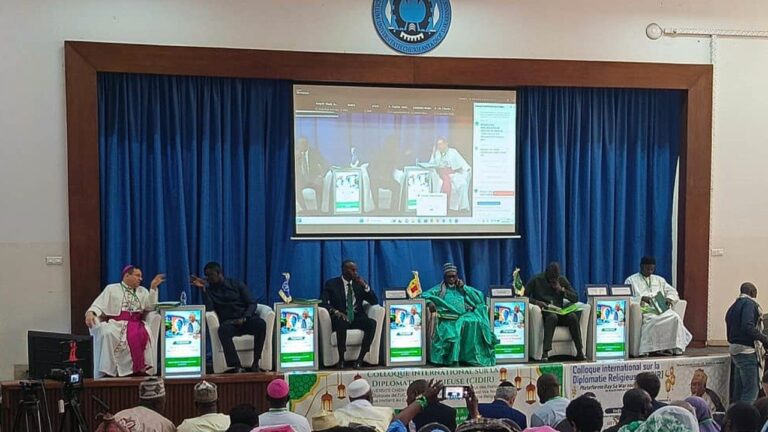An international symposium on religious diplomacy, hosted by Cheikh Anta Diop University in Dakar, Senegal, has drawn praise from the leadership of the Roman Catholic Church for showcasing Senegal as a compelling example of peaceful religious coexistence. The two-day gathering, held April 7–8, brought together religious leaders, diplomats, and scholars to reflect on the contribution of faith traditions to peacebuilding and conflict mediation.
In a message addressed to the participants, Archbishop Paul Richard Gallagher, Secretary for Relations with States and International Organizations of the Vatican, expressed his esteem for Senegal’s enduring culture of interreligious harmony. Although unable to attend in person due to prior commitments, Archbishop Gallagher’s message was delivered by Archbishop Waldemar Sommertag, Apostolic Nuncio to Senegal.
“The peaceful coexistence between men and women of diverse religious and cultural traditions is a tangible reality in Senegal,” Archbishop Gallagher wrote. His message honored Tierno Amadou Ba, Caliph of Bambilor, as a key figure in nurturing this spirit of unity.
The Vatican diplomat praised what he called “the Senegalese model,” where Muslims, Catholics, Protestants, and followers of traditional African religions often live side by side, and even within the same families. “This exceptional form of social cohesion,” he stated, “ought to be preserved and promoted as an emblem of interreligious dialogue in action.”
During a recent visit to the Vatican City, the Caliph of Bambilor reaffirmed to Church leaders his commitment to strengthening these bonds of fraternity. Archbishop Gallagher described Senegal as “an exemplary nation in its capacity to integrate faith traditions in the service of peace.”
In his address, Archbishop Gallagher underscored the world’s need for “a lasting peace—not merely a temporary cessation of violence, but a peace grounded in justice, solidarity, and moral integrity.”
The message affirmed that religion, far from being a source of division, must be recognized as a vital foundation for reconciliation and mutual understanding. “The Catholic Church,” he said, “strives to show that religious convictions, when rooted in truth and compassion, contribute meaningfully to international dialogue and social cohesion.”
According to the Vatican’s understanding, religious diplomacy is not confined to statecraft or political treaties. Rather, it engages the spiritual and ethical dimensions of human life, fostering trust and communion across cultures.
Symposium Affirms Continuity of Dialogue
The symposium featured a range of participants, including ambassadors serving in Dakar (Senegal), representatives of indigenous religions, and Rabbi Mosche Lewin of France, Vice President of the Conference of European Rabbis.
Archbishop Sommertag, speaking to the assembly, highlighted the global relevance of Senegal’s religious culture. “Everyone recognizes that Senegal is a beacon of coexistence well beyond its national borders,” he said. He also noted the attentiveness of the Senegalese people to the Church’s words and presence, describing the event as “a new momentum for the future.”
Reflecting on his recent meeting with the Caliph of Bambilor, the Catholic Nuncio emphasized the importance of continuity in dialogue. “I shared with him that this work must endure,” he recalled. “He responded with generosity, expressing his readiness to visit again.”
As a sign of this ongoing relationship, the Caliph has invited the Roman Catholic Nuncio to participate in the pilgrimage to Jiala, a revered site in Bambilor, which draws Muslim religious leaders and faithful from across the country. This invitation marks a continuation of the ongoing discussions between Catholic Church leaders and Islamic clerics in the name of interreligious friendship.




